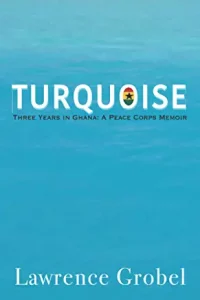Review — TURQUOISE: Three Years in Ghana: A Peace Corps Memoir by Lawrence Grobel
 Turquoise: Three Years in Ghana: A Peace Corps Memoir
Turquoise: Three Years in Ghana: A Peace Corps Memoir
by Lawrence Grobel (Ghana 1968-71)
HMH Press
384 pages
January 2022
$9.00 (Kindle); $ 20.00 (Paperback)
Reviewed by Stephen Foehr (Ethiopia 1965-67)
•
 In 1968, Larry Grobel did the party-hardy at the Aboakyere festival in Ghana, a “crazy, wild stoned-out freaky affair! People filling the streets like army ants around a carcass. No space left uncovered, dancing, drumming, singing and chanting, laughing and shouting, moving, jumping, throwing flags, waving swords, guzzling beer, pito, palm wine and akpeteshe, chewing kola nuts, smoking wee,’ celebrating the way a festival should be celebrated: up high and out of sight!”
In 1968, Larry Grobel did the party-hardy at the Aboakyere festival in Ghana, a “crazy, wild stoned-out freaky affair! People filling the streets like army ants around a carcass. No space left uncovered, dancing, drumming, singing and chanting, laughing and shouting, moving, jumping, throwing flags, waving swords, guzzling beer, pito, palm wine and akpeteshe, chewing kola nuts, smoking wee,’ celebrating the way a festival should be celebrated: up high and out of sight!”
Grobel, then twenty-one, thought he was going to Guyana as a Peace Corps Volunteer. He misread; he was sent to Ghana. The names started with ‘G’ and ended in ‘ana’. One was in South America, the other in West Africa. Didn’t matter, as long as it wasn’t Vietnam, as he explains in his most recent memoir, Turquoise. He opposed the Vietnam War.
Turquoise is a panoply of vignettes of local people, Peace Corps Volunteers, big city Accra, village life, American liberal values, and the values of Ghanaians finding ways to survive. The book, a revisit to Grobel’s days teaching journalism to university students in Accra, benefits from his keen eye and writing skills as the author of 31 books, four screenplays, and interviews with celebrities – Capote, Pavarotti, Miles Davis, Marlon Brando, Al Pacino, Ava Gardner, Kim Basinger, Lily Tomlin, to name a short list. The physical and emotional pulses of Ghana vibrate off the pages. Grobel doesn’t report; he writes as a participant and pulls the reader along as his traveling buddy.
He gives a first-hand inside look into a PC Volunteer’s life — not the altruistic idealist, the prim- and-proper good-body portrayed in posters — but the foreigner who has sex with the locals (and other volunteers), smokes dope, and dances the culture with sweat running down his body. Turquoise is a flick book of youthful adventure, a “search for love, for freedom, for happiness,” in the name of country.
A consistent theme: the author’s lust for Ghanaian women, and their equivalent blatant mercantile interest in him. That and his new year’s resolution to “Live according to and above my wits, means, and indiscretions” makes for entertaining reading, as does the sketches of travel in the back of lorries on dangerous roads with reckless drivers, deadly accidents, and police checks. A trip to Abidjan and parachuting into that city’s Frenchified culture gives stark contrast to life in Accra. Grobel takes us on a train to Upper Volta ravaged by a yellow fever epidemic, the journey with a bad trip of loneliness.
In an extended passage, the author recounts his introduction to Ghana by being embedded with a local family, and learns the mask of friendliness, hospitality and graciousness Ghanaians wear for foreigners, and with each other. In this, he peels back the façade so the reader sees poor people trying to survive. It’s a dog-eat-dog world: “. . . to their fellow citizens, there is a distinct apathy or unfriendliness. No one will come to another’s aid out of brotherly love, a favor is done with the anticipation of a return. Most Ghanaians are secretive and distrustful of one another.” The bureaucratic corruption that invades every-day life is the bedrock of the distrust and hypocrisy. Grobel’s telling of the interactions between his students lays bare the tensions and fissures in the society. The author’s frank, unblinking assessment of the place, and himself in that place, is the value of the book.
Plus, you learn intimate details, like the Ghanaian custom of men shaving their underarm hair, and women trimming their pubic hair.
It can be freaky, weird, living in a strange country with strange people’s seemingly illogical behaviors and incomprehensible beliefs, especially when those people find you weird and incomprehensible. How to make sense of the jumble?
Grobel’s multi-layered verbal portrait miniatures of friends, scammers, neighbors, street hawkers, jujumen, government bureaucrats, and the Ghanaian woman he professed to love, are mosaics that by themselves entertain. The assemblage of the characters, their foibles, caring, scheming, loving, form a mural that gives context. His reader-traveling companions need only to see and listen and laugh at the play of life he presents.
•
 Stephen Foehr (Ethiopia 1965-67) is the author of 6 nonfiction and 5 fiction books (Stephen Foehr.com). His latest novel, BIX (Because I eXist), will be leased Spring 2022.
Stephen Foehr (Ethiopia 1965-67) is the author of 6 nonfiction and 5 fiction books (Stephen Foehr.com). His latest novel, BIX (Because I eXist), will be leased Spring 2022.
Should be an interesting read indeed—Clearly Larry Grobel gained insights (not all of them savory) into Ghana and Ghanians that probably no foreign service officer ever uncovered!